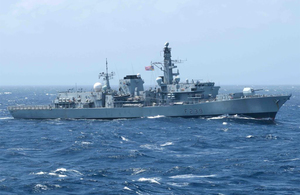UK Carrier Strike Group in the Indo-Pacific
On 24th July, HMS Richmond will enter Thailand’s territorial waters to conduct a maritime military exercise with the Royal Thai Navy. This will be first engagement of the UK Carrier Strike Group with an ASEAN nation.

On 24th July, HMS Richmond will enter Thailand’s territorial waters to conduct a maritime military exercise with the Royal Thai Navy. This will be the first visit of a Royal Navy ship to Thailand since HMS Daring visited in 2014, and the first engagement of the UK Carrier Strike Group with an ASEAN nation.
HMS Richmond is part of the United Kingdom’s Carrier Strike Group, the greatest concentration of maritime and air power to leave the UK in a generation. Led by HMS Queen Elizabeth, the largest and most powerful surface vessel in the Royal Navy’s history on her first operational deployment, the Group consists of 9 ships, 32 aircraft, and 3700 personnel. Whilst strong on our own, we are stronger with allies. The Carrier Strike Group will lead several NATO exercises and two of our oldest and closest partners in the US and the Netherlands will be fully integrated into the deployment.
The Carrier Strike Group is a demonstration of Prime Minister Boris Johnson’s vision of a ‘Global Britain’. As articulated in this year’s Integrated Review of foreign policy, defence and development, the UK is a problem-solving and burden-sharing nation with a global perspective, playing a leading international role in collective security, multilateral governance, tackling climate change and health risks, conflict resolution and poverty reduction. However, to be open we must be secure. As a maritime trading nation championing the free flow of trade, capital, data, innovation and ideas, the Group’s deployment demonstrates the UK’s strategic flexibility and global reach. Benefitting from an impressive array of the UK’s world-leading defence capabilities, the Group is capable of operating independently to counter state and non-state threats as well as contribute to humanitarian and disaster relief missions.
When the Carrier Strike Group left Portsmouth in May, it embarked on a truly global journey. Returning to the UK in December, it will have travelled over 26,000 nautical miles, from the Mediterranean to the Red Sea, from the Gulf of Aden to the Arabian Sea, and from the Indian Ocean to the Philippine Sea and back. It will have interacted with 40 nations during its tour and undertaken over 70 engagements, exercises and operations with allies and partners.
Between July and October, the Carrier Strike Group will deploy to the Indo-Pacific region, transiting through the Asia the Malacca Straits on its way to Japan. While the major stops in the region for HMS Queen Elizabeth are Singapore, the Republic of Korea, Japan, and India her escort ships, such as HMS Richmond, will engage with regional and ASEAN partners as part of the UK’s commitment to be a persistent, credible and reliable presence in the Indo-Pacific. In the region, the Group will contribute with allies to the US-led ‘Large Scale Global Exercise’, to UN mandated sanctions enforcement and to a Five Powers Defence Arrangement exercise, the FPDA being Southeast Asia’s only collective security arrangement. For Thailand, our maritime engagement will contribute to our strengthened defence relationship, which will deliver more shared professional military education activity, and increased co-operation on a range of areas of mutual concern from international peace operations and counter terrorism to military medicine and humanitarian assistance and disaster relief.
The Carrier Strike Group’s visit to the region is also evidence of the UK’s so-called Indo-Pacific Tilt’. This region matters to the UK: it is critical to our economy, our security and our commitment to support open societies. At least 1.7 million British citizens live across the region, with 50,000 in Thailand alone, and our trading relationships continue to grow. In the decades to come the region will be the crucible for many of the most pressing global challenges – from climate and biodiversity to maritime security and geopolitical competition linked to rules and norms. Therefore, over the next decade we will deepen our engagement with the Indo-Pacific region, establishing a greater and more persistent presence in the region than any other European country, as seen by our application to become an ASEAN Dialogue Partner and also to join the Comprehensive and Progressive Agreement for Trans-Pacific Partnership or CPTPP.
Here in Thailand, our bilateral relationship has strong foundations, close connections between our citizens and a comprehensive agenda of practical collaboration on shared priorities such as health, economic recovery, climate change, security and defence. We welcome the proximity of the Carrier Strike Group to Thailand as a symbol of our mutual commitment to a free and open Asia Pacific with all the benefits that affords to shared regional and global security and prosperity.